Featured
Table of Contents
- – Gurabo, PR Tree Clearing Cost Guide
- – What You Need To Know About Stump Removal Cost...
- – Insurance Costs For Tree Removal In Gurabo, PR
- – Gurabo, PR Arborist Financing Options
- – Check Local Tree Service Costs In Gurabo, PR
- – What You'll Pay For An Stump Grinding In Gura...
- – Gurabo, PR Arborist Price Calculator
- – Locating Quality Tree Clearing In Gurabo, PR
- – Gurabo, PR Tree Clearing Price Estimator
- – Discounts On Tree Service In Gurabo, PR
- – Gurabo, PR Tree Cutting Cost Overview 2025
- – Gurabo, PR Arborist: Bundle Costs
- – Gurabo, PR Arborist Installation Cost Guide
- – Gurabo, PR Tree Service Price Comparison Tool
- – What Will An Tree Removal Cost Me In Gurabo,...

The subsections below provide more comprehensive info about rates, including an average variety for each. TypeAverage Elimination CostPineConiferPalmMagnoliaArborvitaeAshCedarSweet GumEucalyptusSycamoreCypressOakMaplePoplar You can expect to pay between to eliminate a pine, depending upon its size. Eliminating a pine is among the more economical jobs unless it is one that has been around for many years and is quite large.
Gurabo, PR Tree Clearing Cost Guide
Pines also have a tap root that grows deep into the soil, which can show to be harder to get rid of. The procedure itself includes a specialist cutting the tree, clearing the base, cutting the surface roots, eliminating the stump, and lastly treating the soil. Without an expert hand, you run the risk of leaving pine seedlings behind, which will fall from the roots of distressed pines.
What You Need To Know About Stump Removal Costs In Gurabo, PR
The U.S. national average for conifer elimination is around to have the conifer reduced, transported away, and the stump ground or removed completely. Conifers are generally simpler to eliminate, and although they can grow quite high, they do not cost a fortune to eliminate. Conifers include pine, spruce, fir, and juniper trees.
Insurance Costs For Tree Removal In Gurabo, PR
While conifers are stunning, they eliminate native plants and certain kinds of yard. This is because they require a lot of water and nutrients to survive, so they leach it off surrounding plants. They likewise have an expansive network of roots, which can affect your home's foundation. The average cost of palm elimination depends upon the height as much as the type, varying from.
Gurabo, PR Arborist Financing Options
That is why it is important to understand which type you are getting rid of. While you do not need an herbicide to eliminate a palm tree, there are some actions your elimination professional will need to take to make sure the task is done properly. There are 2 ways they can get rid of them: by slicing them down or digging them up.
Check Local Tree Service Costs In Gurabo, PR
From there, they get rid of the real tree and then the stump. Anticipate to pay in between to remove this type of tree, depending on the exact size and information of the task.
What You'll Pay For An Stump Grinding In Gurabo, PR
There are three types: green, white, and black ash. With its gray-tinged bark, its leaves are green or purple in the spring and golden yellow or purplish-red in the fall.
Gurabo, PR Arborist Price Calculator

However, the bark is softer, and it flowers later in the year. Due to the variation in height, the removal rate variation is broad from. A coniferous, evergreen tree, the cedar is a hardy species. True cedars delight in higher elevations, generally in the Mountain ranges and the Mediterranean. A real cedar can grow as high as 160 feet in height and is typically planted in the United States as a landscape option.
Locating Quality Tree Clearing In Gurabo, PR
The development of false cedars differs from 50 feet approximately 230 feet high. Homeowners might pay anywhere from, depending on the roots. With star-shaped leaves and spectacular fall colors, the sweet gum is considered a medium to large tree. Enjoying complete sun, the sweet gum can not endure contamination.
Gurabo, PR Tree Clearing Price Estimator
It has a huge root base of 40 to 50 feet, which affects the removal expense. Usually, it costs between to remove a eucalyptus. Eucalyptus are not typical all over, but they are quite large compared to others, which is why even the smaller sized ones are so expensive to remove. Initially from Australia, eucalyptus are intrusive plants that grow in thick groves that get native plants.
Discounts On Tree Service In Gurabo, PR
There are a handful of ways to do this, consisting of burning, pulling, grinding, or eliminating them with herbicide. Expect to pay between to remove sycamores, based on the height, trunk size, and amount of work included. Sycamores are one of the biggest hardwood trees, generally ranging from 60 to 100 feet high and as large as 15 feet.
Gurabo, PR Tree Cutting Cost Overview 2025
The very first 2 actions will expose the withins of the tree and cut off the flow of nutrients up the trunk. From there, a professional uses herbicide to kill the tree and lower the trunk. They will kill the stump. Otherwise, brand-new sprouts might grow from it. Lowering and eliminating a full-grown cypress could cost as much as.
Gurabo, PR Arborist: Bundle Costs
There are various kinds of Cypress trees, but the most prevalent are the Leyland, Arizona, Bald, and Italian. The Bald Cypress grows in swampy or extremely damp areas while the others delight in a dry, warm, or hot environment (tree clearing). They can grow as high as 80 to 100 feet tall
Gurabo, PR Arborist Installation Cost Guide

Prone to diseases, the Cypress is among the most prized woods for furnishings. The average oak grows to around 60 feet, and depending on the intricacy of the removal, it costs an average of to get rid of. The precise size of your oak and the effort required to fell it affect what you will in fact spend for elimination in addition to any additional services like stump grinding.
Gurabo, PR Tree Service Price Comparison Tool
Access to the trees and the roots will likewise impact the total expense. Maples are usually among the more expensive trees to get rid of because of their size and the work involved in the removal.
What Will An Tree Removal Cost Me In Gurabo, PR?
Growing as high as 90 to 115 feet, these enormous lumbers are generally discovered in North America and include the aspen, cottonwood, and balsam trees. The procedure to get rid of trees includes all the cutting and cutting of the branches and trunk, bringing it down to a stump.
Table of Contents
- – Gurabo, PR Tree Clearing Cost Guide
- – What You Need To Know About Stump Removal Cost...
- – Insurance Costs For Tree Removal In Gurabo, PR
- – Gurabo, PR Arborist Financing Options
- – Check Local Tree Service Costs In Gurabo, PR
- – What You'll Pay For An Stump Grinding In Gura...
- – Gurabo, PR Arborist Price Calculator
- – Locating Quality Tree Clearing In Gurabo, PR
- – Gurabo, PR Tree Clearing Price Estimator
- – Discounts On Tree Service In Gurabo, PR
- – Gurabo, PR Tree Cutting Cost Overview 2025
- – Gurabo, PR Arborist: Bundle Costs
- – Gurabo, PR Arborist Installation Cost Guide
- – Gurabo, PR Tree Service Price Comparison Tool
- – What Will An Tree Removal Cost Me In Gurabo,...
Latest Posts
Extra Stump Removal Costs In Moreno Valley, CA: What To Watch For
Avon Park, FL Tree Trimming: Real Cost Breakdown
Comparing Bowie, TX Arborist: Prices
More
Latest Posts
Extra Stump Removal Costs In Moreno Valley, CA: What To Watch For
Avon Park, FL Tree Trimming: Real Cost Breakdown
Comparing Bowie, TX Arborist: Prices